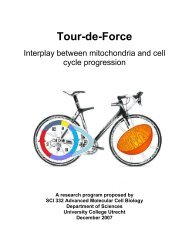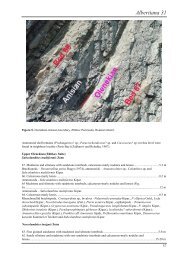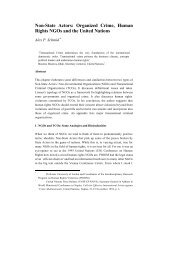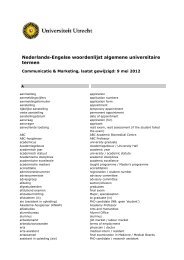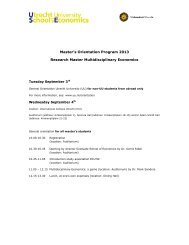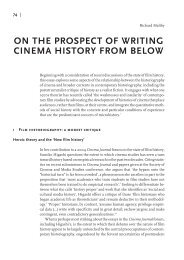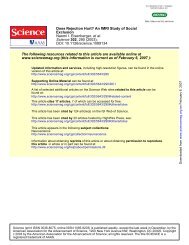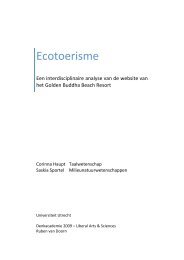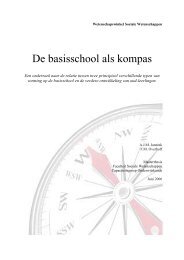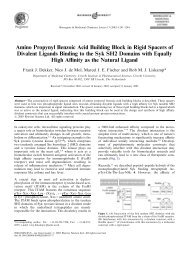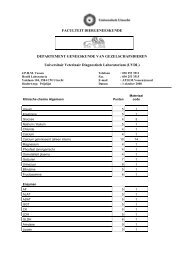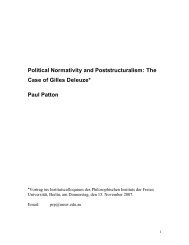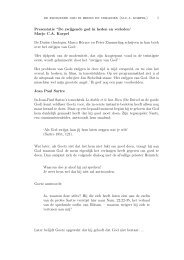Review of the Research Institute for History and - Universiteit Utrecht
Review of the Research Institute for History and - Universiteit Utrecht
Review of the Research Institute for History and - Universiteit Utrecht
Create successful ePaper yourself
Turn your PDF publications into a flip-book with our unique Google optimized e-Paper software.
Introduction<br />
During <strong>the</strong> past eight years a variety <strong>of</strong> interesting <strong>and</strong> inspiring research activities at <strong>the</strong> Onderzoekinstituut<br />
voor Geschiedenis en Cultuur (<strong>Research</strong> <strong>Institute</strong> <strong>for</strong> <strong>History</strong> <strong>and</strong> Culture, OGC) have borne fruit. Notable<br />
successes have been achieved during <strong>the</strong> period under review. It is <strong>the</strong>se research activities that we would<br />
like to highlight in particular in this review. Because research is our core business, we have chosen to present<br />
<strong>the</strong> research programmes <strong>and</strong> <strong>the</strong>ir work in <strong>the</strong> fi rst part <strong>of</strong> this report, whilst <strong>the</strong> institute, with its supportive<br />
facilities, is discussed in <strong>the</strong> second part. The reader who is interested in in<strong>for</strong>mation on organizational<br />
matters, which constitute <strong>the</strong> framework <strong>of</strong> <strong>the</strong> actual research, is advised to consult section B fi rst.<br />
During <strong>the</strong> eight years under review, 1997-2004, OGC scholars published signifi cant books with highlyreputed<br />
publishers. From <strong>the</strong> rich crop we would like to mention Hans Bertens’ textbook Literary Theory:<br />
<strong>the</strong> Basics (Routledge 2001), Bart Besamusca <strong>and</strong> Paul Wackers’ defi nitive edition in two volumes <strong>of</strong> Van<br />
den vos Reynaerde (Bert Bakker 2002), Albert Blankert’s collection <strong>of</strong> essays Selected Writings on Dutch Painting<br />
(Wa<strong>and</strong>ers 2004), Rosi Braidotti’s innovative study Metamorphoses: Towards a Materialist Theory <strong>of</strong> Becoming<br />
(Polity 2002), Jeroen Duindam’s comparative history Vienna <strong>and</strong> Versailles: <strong>the</strong> Courts <strong>of</strong> Europe’s Dynastic Rivals,<br />
1550-1780 (Cambridge UP 2003), <strong>the</strong> survey by Louis Grijp et al., Een muziekgeschiedenis der Nederl<strong>and</strong>en<br />
(Amsterdam UP 2001), <strong>the</strong> milestone in <strong>the</strong> study <strong>of</strong> Islamic Mysticism edited by Frederick de Jong, Islamic<br />
Mysticism Contested. Thirteen Centuries <strong>of</strong> Controversies <strong>and</strong> Polemics (Brill 1999), Ann Rigney who happily<br />
returned after a 3-years pr<strong>of</strong>essorship at Vrije <strong>Universiteit</strong> (Amsterdam) published Imperfect histories: <strong>the</strong> elusive<br />
past <strong>and</strong> <strong>the</strong> legacy <strong>of</strong> historic romanticism (Cornell UP 2001), Jan Luiten van Z<strong>and</strong>en <strong>and</strong> Arthur van Riel’s<br />
groundbreaking The strictures <strong>of</strong> inheritance. The Dutch economy in <strong>the</strong> nineteenth century (Princeton UP 2004),<br />
as well as <strong>the</strong> one-<strong>and</strong>-a-half `<strong>Utrecht</strong>’ volumes in <strong>the</strong> four-volume milestone series Nederl<strong>and</strong>se cultuur in<br />
Europese Context: Joost Kloek, Wijn<strong>and</strong> Mijnhardt, 1800: Blauwdrukken voor een samenleving, <strong>and</strong> Jan Bank,<br />
Maarten van Buuren, 1900: hoogtij van burgerlijke cultuur, now published as 1800: Blueprints <strong>for</strong> a National Community<br />
<strong>and</strong> 1900: <strong>the</strong> Age <strong>of</strong> Bourgeois Culture (both Palgrave 2004). Perhaps most impressive in terms <strong>of</strong> impact<br />
was <strong>the</strong> huge study on <strong>the</strong> Dutch in <strong>for</strong>mer Yugoslavia, Srebrenica, een `veilig’ gebied (Boom 2002), with a major<br />
contribution by Bob de Graaff. This book toppled <strong>the</strong> Dutch government in 2002.<br />
OGC scholars acquired prestigious grants <strong>for</strong> <strong>the</strong>ir research projects, most notably Josine Blok <strong>for</strong> her<br />
project on Citizenship in Classical A<strong>the</strong>ns, <strong>and</strong> Koen Ottenheym <strong>for</strong> a combined project with <strong>the</strong> Catholic<br />
University <strong>of</strong> Louvain on <strong>the</strong> architectural relations between <strong>the</strong> Sou<strong>the</strong>rn <strong>and</strong> <strong>the</strong> Nor<strong>the</strong>rn Ne<strong>the</strong>rl<strong>and</strong>s.<br />
Jan Luiten van Z<strong>and</strong>en was awarded <strong>the</strong> Spinoza Prize by NWO, allowing him to develop a programme on<br />
Economic Development <strong>and</strong> Inequality in World <strong>History</strong>.<br />
OGC scholars were elected to prestigious posts in <strong>the</strong> institutions <strong>of</strong> <strong>the</strong>ir chosen fi elds <strong>of</strong> expertise.<br />
Bart Besamusca became president <strong>of</strong> <strong>the</strong> International Arthurian Society in 2002, Frank Kessler became<br />
president <strong>of</strong> DOMITOR, International Association <strong>for</strong> <strong>Research</strong> on Early Cinema in 2003, Jan Luiten van<br />
Z<strong>and</strong>en has been secretary-general <strong>of</strong> <strong>the</strong> International Economic <strong>History</strong> Association since 1998. In 2003<br />
<strong>Utrecht</strong> hosted <strong>the</strong> fi rst worldwide conference in computer-games research, Level Up, which was organized<br />
by Marinka Copier <strong>and</strong> Joost Raessens. It is <strong>the</strong>re<strong>for</strong>e fair to say that, during <strong>the</strong> period under review, OGC<br />
scholars were able to continue to make valuable contributions to <strong>the</strong> rich <strong>and</strong> fertile fi elds <strong>of</strong> Humanities<br />
research, specifi cally within <strong>the</strong> context <strong>of</strong> <strong>the</strong> following <strong>Utrecht</strong> programmes:<br />
1. Ancient <strong>and</strong> Medieval Cultures.<br />
2. Cultural Infrastructure <strong>and</strong> Intellectual Culture in <strong>the</strong> Modern Age<br />
3. The Cultural Construction <strong>of</strong> Media<br />
4. Arts, Culture <strong>and</strong> <strong>the</strong>ir Contexts<br />
5. Art <strong>History</strong><br />
6. Literary Studies<br />
7. Oriental Studies<br />
8. International <strong>and</strong> Political <strong>History</strong><br />
9. Social <strong>and</strong> Economic <strong>History</strong><br />
10. Gender Studies<br />
7 Introduction OGC



